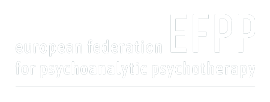History
EFPP membership, sections & Board
Constitution
EFPP Board
Areas of Work & Future Tasks
Join EFPP
Areas of Work & Future Tasks
Main areas of work
The main aim of the Board’s work is to keep abreast of the psychotherapeutic developments within the member organisations in the different countries, with a special emphasis on conditions for working with patients, facilities for training in psychoanalytic psychotherapy, and research.
Another main area of work is connected to the EFPP conferences. In the first few years each section had an annual conference and a three-section conference was arranged every third or fourth year. However, it gradually became clear that this was in excess of what was needed, and it was decided that each section should hold their own section conference in turn. Accordingly, a Group Section conference was held in Lisbon in 2004, an Adult section conference in Dresden in 2005, and a Child and Adolescent Section conference in Berlin in 2006. A three-section conference followed in Copenhagen in 2007, a Group Section conference in Prague in 2008, and Couple and Family conference in Florence in 2009. Since the inception of the fourth section our schedule has had to be revised to incorporate combined section conferences. The combined Adult and Child and Adolescent conference was held in Cracow in 2011, and the combined Group and Couple and Family conference in Athens in 2012. A combined four-section conference took place in Berlin 2015, and a conference organised by the sections for groups and couple & family was just held in Belgrade 2018. A local organising committee is appointed for each conference which works closely with the Board’s conference co-ordinator.
A special feature of the EFPP conferences are the discussion groups held after each plenary session. Much appreciated by attendees is the fact that the configuration of the groups remains the same throughout the conference, which contributes to deeper understanding of the papers presented and fosters greater sharing of ideas and emotions. The conferences also offer a number of ongoing workshops.
The EFPP also organises smaller workshops focusing on topics such as Infant Observation. Two research conferences on child and adolescent psychotherapy have also been held in Stockholm. Another example is the Syros workshop, which focuses on clinical presentations and has been organised every two years for more than a decade.
Outlook to future tasks
An area requiring further attention is that of research in the field of current psychoanalytic theories and practice. One area that shows potential for further development is primarily that of clinically-based research, where the clinicians themselves can contribute in a more integrated way through the systematic documentation of their own clinical work. This type of research is now being done in many European countries with positive results. This is becoming increasingly urgent as insurance companies and health authorities in many European countries have cut back on funding for psychotherapy and will only fund solid, evidence-based therapies. The dissemination of research now available from an increasing number of specific studies in the field of psychoanalytic psychotherapy and its effectiveness is a primary task for the EFPP.
In this way we hope all our member organisations and countries will have access to study- based research which they can use when making a case for psychotherapy in their own countries. To do this the EFPP website reports on this field’s main findings to allow continuous and interactive communication among member organisations.
The EFPP Research Award seeks to enhance and acknowledge the exchange between clinicians and researchers in our member organisations. The award is given to authors of papers or books in the field of psychoanalytic psychotherapy that deal with a research issue or are the product of concrete research in the psychoanalytic psychotherapeutic field. Winners of the award receive a monetary prize of €2000. The EFPP Research Award is presented every second year during the EFPP Delegates Meeting, where the award recipient is expected to present her or his paper to the Delegates.


